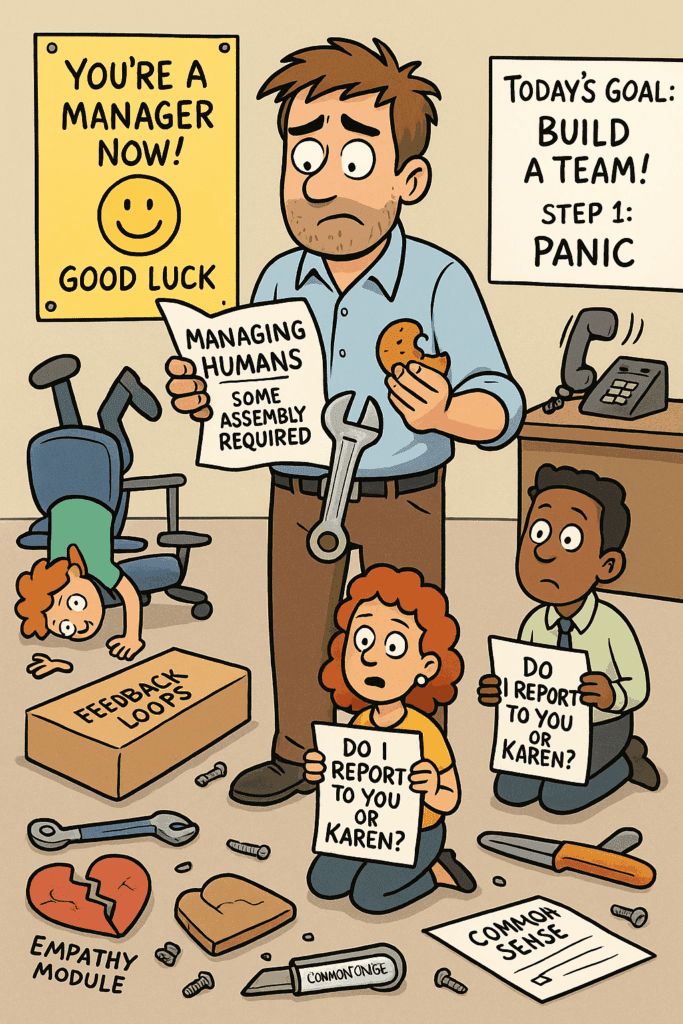CEO Coaching: Management as a Secret Weapon
 Another day, another poll telling us that managers are miserable and their teams are just as cranky. Shocking, right?
Another day, another poll telling us that managers are miserable and their teams are just as cranky. Shocking, right?
I’ve been coaching executives and blogging about leadership for over 20 years. So have thousands of others—some with podcasts, TED Talks, and Instagram-worthy hair. And yet… nothing changes. Companies still hire managers based on résumés, vibes, or sheer desperation, then throw them into the deep end with no training. It’s like watching someone try to assemble IKEA furniture blindfolded—with a spatula.
Let’s be real: this is a massive wasted opportunity. (Yes, I’m intentionally blurring the line between management and leadership today. I know they’re different. Relax.)
The people who actually study leadership—who read the books, take the courses, and get the coaching—are the ones who understand its value. If you’re the type who thinks “managing people” just means being bossy and winging it, feel free to stop reading. Godspeed, Captain Chaos.
But if you’re in the camp that believes there’s a massive gap between great management and mediocrity, congratulations. That belief alone gives you a competitive advantage.
A real one. Like IP-level valuable.
Great management is just as critical as a strong balance sheet or a killer product. Of course, you still need to identify a profitable market and offer something customers actually want. (That’s called strategy, and yes, it’s also teachable.) But once you’ve done that, superior management will keep you ahead of the clueless herd who think “feedback” is something you only give during annual reviews.
Now, everyone has their own take on what makes a great manager. Here’s mine—a Greatest Hits list of 10:
-
Sets high expectations and gives regular feedback
-
Has emotional intelligence (not just IQ points and caffeine)
-
Actually does strategic thinking
-
Communicates clearly and often
-
Makes decisions (without forming a committee to plan a meeting about deciding)
-
Handles tough conversations without crying or ghosting
-
Works hard
-
Builds real commitment from their team
-
Is ethical (like, “do the right thing” ethical, not “technically legal” ethical)
-
Bounces back after setbacks
But here’s the kicker: even the best management practices decay over time. Competitive advantages are not eternal; they’re subject to the same entropy that eats your muscles when you stop going to the gym. You’ve got to maintain and renew them.
So, yes, I know I’m preaching to the choir. But even the choir needs a reminder now and then:
Don’t be lazy. Don’t cheap out. Don’t assume good management “just happens.”
Invest in your managers. Coach them. Mentor them. Inspect what you expect. If you want management to be your secret weapon, treat it like one. Build it. Sharpen it. Keep it ready.
And if you can’t tell me your process for doing that?
You don’t have one.

coaches CEOs to higher levels of success. He is a former CEO and has led teams as large as 7,000 people. Todd is the author of, Never Kick a Cow Chip On A Hot Day: Real Lessons for Real CEOs and Those Who Want To Be (Morgan James Publishing).
Connect with Todd on LinkedIn, Twitter, call 303-527-0417 or email [email protected].
